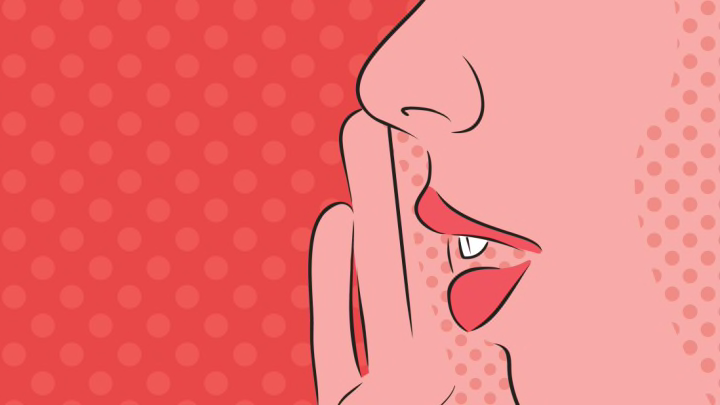DEAR A.J.,
Help! I feel I have no privacy anymore. Facebook, Google, and Target know more about my life than my own husband does. Where has all the privacy gone?
Kathleen
Dear Kathleen,
Thanks for writing. I’ve recorded your name, address, marital status, and income level for my email list. You’ll be hearing from me soon!
In the meantime, maybe this will make you feel better: Privacy may be endangered in the digital age, but at least we’re still better off than many of our ancestors. In the past, everyone was all up in your business.
1. Peeping Tithingmen
Consider the Puritans: They were stunningly good at privacy invasion. In colonial America, Puritan villages had professional snoopers called “tithingmen.” Part of a tithingman’s job was to peek into their neighbors’ windows and spy on their every move to ensure they weren’t doing anything naughty, such as (gasp!) going for a stroll on the Sabbath—a crime that could be punishable by a day in the stocks.
2. Snail Mail Breaches
If you’re worried about hackers (or husbands) monitoring your emails, you should know that pen-and-ink mail was even more vulnerable back in the day. In early America, before an official postal service existed, letters were frequently left at taverns and coffeehouses to be picked up by the recipient—often after they’d been perused by other inquisitive customers. Things didn’t get much better when the government got involved. Postal workers were notorious for peeping at mail. Even letters from the Founding Fathers weren’t immune. Thomas Jefferson complained about the “curiosity of the post-offices” who enjoyed opening and reading his correspondence.
3. Public Voting—Out Loud
Speaking of the government: Voting was not always a private affair conducted behind the safety of a curtain. In early America, everyone knew your vote. They heard it loud and clear. You voted by stepping up to an election officer and announcing your vote in front of spectators. The practice was called viva voce—by voice. This, naturally, led to intimidation and harassment. As Paula Wasley writes in Humanities magazine, voting was “spectacularly public ... accompanied by boisterous crowds, partisan hecklers, torchlight parades, free-flowing whiskey, and brawling.” Casting your vote was less like participating in a dignified civic ritual and more like attending a Gathering of the Juggalos.
4. Nosy Questions on the (Publicly Posted) Census
You won’t find much respect for privacy in the old days of the U.S. census. The questions in the 1800s were astoundingly nosy. Uncle Sam asked about your mental health, whether you were “crippled, maimed, or deformed,” and questions about the financial status of homes and farms. The results of the early census were also posted in public, ostensibly so you could check them for accuracy, but in reality so that all your neighbors could titter.
5. Newspapers Printed Ailments
And if you didn’t know your neighbor’s frailties from the census, busybody local newspapers were there to fill you in. With no pesky HIPAA laws to get in the way, hospital admissions were popular fodder for newspapers for decades. For instance, an issue of the 1885 Philadelphia Inquirer told us that 53-year-old Hugh Dady had to go to the hospital after he received a head cut from a falling barrel.
6. Newspapers Printed Addresses
And if that’s not enough, the paper gives us what certainly appears to be the ailing folks’ addresses, such as “Francis Reynolds, aged twenty-seven, of No. 2335 Owen Street, with sprained wrist, from heavy lifting.” It was like TMZ, but if every celebrity was very boring.
7. Pooping in Public
But I’ve saved the worst for last. Because in the days of yore, even your most intimate acts—including going to the bathroom—occurred with very little privacy. In ancient Rome, you did your business in a public latrine with dozens of seats side by side. Archaeologists have found board games in between the toilets, indicating that voiding was a social occasion, much like a trip to the pub. Even the Father of our Country might not have pooped alone: Mount Vernon has a cozy three-seat outhouse. Over on the other side of the pond, Henry VIII had a formal assistant called “The Groom of the Stool,” a bathroom attendant whose job supposedly consisted of, in part, wiping the glorious monarchical butt.
8. Sex on Trial
What’s more, marital problems were shockingly out in the open. Consider the bizarreness that were the impotence trials of pre-Revolutionary France. A woman could ask to end a marriage on the grounds that her husband failed to consummate a marriage … but she had to prove it in front of witnesses. The most notorious such trial was in 1659, when a Marquis had to attempt sex with his wife in front of a 15-person jury, including doctors. The trial was so public, Frenchmen placed bets on the outcome. I’d tell you what happened, but I don’t want to invade the nobleman’s privacy yet again. (OK, fine. He failed. Happy?)
